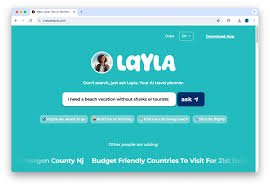The travel industry has undergone significant transformations over the past decade, with technology playing a pivotal role in reshaping how we plan and experience trips. Among the most groundbreaking advancements is the emergence of AI-powered apps designed to streamline and enhance trip planning. These intelligent applications leverage machine learning, natural language processing, and big data analytics to provide personalized recommendations, optimize itineraries, and even predict travel disruptions. Gone are the days of sifting through countless websites and guidebooks—AI trip planning apps promise a seamless, efficient, and highly customized travel experience.
As more travelers seek convenience and personalization, AI-driven solutions are becoming indispensable tools. Whether it’s suggesting the best flight deals, curating restaurant recommendations based on dietary preferences, or adjusting schedules in real-time due to unforeseen delays, these apps are redefining travel efficiency. The integration of AI into trip planning not only saves time but also enhances the overall journey by eliminating guesswork and reducing stress. With the ability to learn from user behavior and preferences, these apps continuously refine their suggestions, ensuring that each trip is better than the last.
The rise of AI in travel planning also reflects broader trends in consumer expectations. Today’s travelers demand instant, accurate, and hyper-relevant information, and AI apps deliver precisely that. From solo backpackers to luxury vacationers, these tools cater to diverse needs, making them a universal asset in modern travel. As AI technology evolves, its applications in trip planning will only grow more sophisticated, further cementing its role as an essential companion for globetrotters.
How AI Trip Planning Apps Work
AI-powered trip planning apps rely on complex algorithms that analyze vast amounts of data to generate tailored travel suggestions. By processing inputs such as budget constraints, preferred destinations, travel dates, and past behavior, these apps create optimized itineraries that align with individual preferences. Machine learning enables the software to improve over time, refining its recommendations based on user feedback and changing trends. For instance, if a traveler frequently visits art museums, the app will prioritize cultural attractions in future suggestions.
Natural language processing (NLP) is another critical component, allowing users to interact with these apps conversationally. Instead of manually inputting every detail, travelers can simply type or speak their requests, such as, “Find me a family-friendly hotel in Bali near the beach,” and the AI will generate relevant options. Some advanced apps even integrate with chatbots and virtual assistants, providing real-time support during trips. Additionally, predictive analytics help anticipate potential disruptions, such as flight delays or weather changes, allowing the app to suggest alternative arrangements proactively.
Data aggregation is another key feature, as AI apps pull information from multiple sources—flight databases, hotel booking platforms, restaurant reviews, and local event calendars—to present comprehensive travel options. By cross-referencing real-time data, these tools ensure that recommendations are up-to-date and accurate. The result is a dynamic, responsive travel assistant that adapts to both the traveler’s needs and external variables, delivering a hassle-free planning experience.
Key Features of AI-Powered Trip Planning Apps
One of the standout features of AI trip planning apps is their ability to create fully customized itineraries. Unlike traditional travel agencies or generic online guides, AI apps consider personal preferences, such as dietary restrictions, activity levels, and even sleep patterns, to craft a schedule that maximizes enjoyment and minimizes stress. For example, an app might suggest a leisurely morning for someone who dislikes early starts or recommend gluten-free dining options for travelers with specific dietary needs.
Real-time updates and notifications are another major advantage. AI apps continuously monitor flight statuses, weather conditions, and local events, alerting users to any changes that might affect their plans. If a flight is delayed, the app can automatically adjust hotel check-in times or reschedule activities accordingly. Similarly, if a popular attraction is unexpectedly closed, the app can suggest alternative experiences based on the traveler’s interests. This level of adaptability ensures that trips remain smooth and enjoyable, even when unforeseen issues arise.
Budget optimization is also a significant benefit. AI apps can track expenses, compare prices across multiple platforms, and even predict future costs based on historical data. By analyzing spending patterns, these tools can alert users when they’re exceeding their budget or recommend cost-saving alternatives, such as off-peak travel times or discounted attraction tickets. Some apps also integrate with financial platforms, allowing travelers to manage bookings and payments in one place, further simplifying the process.
7 Best AI Apps for Trip Planning
Planning a trip can be overwhelming, but AI-powered apps make it effortless. Here are the top 7 AI trip-planning apps to help you organize your next adventure:
1. Wanderlog (https://wanderlog.com)

- Combines AI and human recommendations for personalized itineraries.
- Syncs flights, hotels, and activities in one place.
- Great for road trips, group travel, and solo adventures.
2. TripIt (https://www.tripit.com)
- AI-powered travel organizer that automatically creates a master itinerary.
- Tracks flights, hotels, car rentals, and reservations.
- Pro version offers real-time alerts and alternative flight options.
3. Roam Around (https://www.roamaround.io)

- Free AI trip planner powered by ChatGPT.
- Generates custom travel plans based on destination, budget, and interests.
- Great for quick, hassle-free itinerary suggestions.
4. Hopper (https://www.hopper.com)
- AI predicts flight and hotel prices with 95% accuracy.
- Sends alerts for the best booking times.
- Offers “Price Freeze” and refundable ticket options.
5. Kayak (https://www.kayak.com)
- AI-powered search engine for flights, hotels, and car rentals.
- “Price Forecast” tool advises whether to book now or wait.
- Integrates with Google Maps for easy navigation.
6. Layla (formerly Mezi) (https://www.layla.travel)

- AI travel assistant that learns your preferences.
- Helps book flights, hotels, and activities via chat.
- Works with popular booking platforms like Expedia and Booking.com.
7. Plan by ixigo (https://www.ixigo.com)
- AI-driven trip planner for Indian travelers.
- Suggests optimized routes, budget stays, and local experiences.
- Real-time price tracking for flights and trains.
The Benefits of Using AI for Trip Planning
The primary advantage of AI trip-planning apps is the sheer convenience they offer. Instead of spending hours researching and comparing options, travelers can rely on AI to do the heavy lifting, delivering curated recommendations in seconds. This efficiency is particularly valuable for busy professionals or those planning last-minute trips, as it eliminates the stress of manual coordination. Additionally, AI’s ability to process vast datasets means it can uncover hidden gems—boutique hotels, underrated restaurants, or off-the-beaten-path attractions—that might otherwise go unnoticed.
Personalization is another major benefit. Unlike static guidebooks or generic online resources, AI apps tailor suggestions to individual preferences, ensuring a more enjoyable and relevant travel experience. Whether someone is an adventure seeker, a foodie, or a history buff, the app will prioritize activities and destinations that align with their interests. This level of customization enhances satisfaction and reduces the likelihood of disappointing experiences.
Finally, AI apps contribute to smarter, more informed travel decisions. By analyzing trends and predicting outcomes, they help users avoid common pitfalls, such as overpaying for flights or visiting overcrowded attractions. Real-time data ensures that travelers are always equipped with the latest information, empowering them to make adjustments on the go. In an era where time and accuracy are paramount, AI trip planning apps provide an invaluable edge.
Challenges and Limitations of AI Trip Planning Apps
Despite their many advantages, AI-powered trip planning apps are not without limitations. One challenge is the reliance on data accuracy. If an app pulls incorrect or outdated information—such as a restaurant that has closed or a misreported flight delay—it can lead to frustration and disrupted plans. While AI continuously improves, occasional errors are inevitable, highlighting the need for human oversight in critical situations.
Privacy concerns also arise with AI apps, as they often require access to personal data—location history, search behavior, payment details—to function effectively. Users must trust that their information is secure and used ethically, which can be a sticking point for those wary of data breaches or misuse. Transparency in data handling and robust security measures are essential to maintaining user confidence.
Another limitation is the potential lack of spontaneity. While AI excels at optimizing schedules, some travelers thrive on unplanned adventures and serendipitous discoveries. Over-reliance on app-generated itineraries might stifle this sense of exploration, leading to overly structured trips. Balancing AI recommendations with personal flexibility is key to maintaining the joy of travel.
The Future of AI in Trip Planning
As AI technology advances, its applications in trip planning will become even more sophisticated. Future developments may include enhanced voice recognition, allowing for more natural and intuitive interactions with travel assistants. Imagine simply telling your app, “Plan a two-week trip to Japan with a mix of cultural sites and outdoor adventures,” and receiving a fully detailed itinerary within minutes.
Integration with other emerging technologies, such as augmented reality (AR) and virtual reality (VR), could further revolutionize travel planning. AR might enable users to “preview” hotel rooms or attractions through their smartphones, while VR could offer immersive virtual tours of destinations before booking. Additionally, blockchain technology might enhance security and transparency in payments and bookings, reducing fraud and streamlining transactions.
AI’s role in sustainable travel is another promising frontier. By analyzing carbon footprints and recommending eco-friendly options—such as trains over flights or green hotels—AI apps could help travelers make more environmentally conscious choices. As sustainability becomes a growing priority, these features will likely gain traction, aligning travel convenience with global responsibility.
Ethical Considerations in AI Trip Planning
As AI-powered trip planning apps become more prevalent, ethical concerns surrounding their use have come to the forefront. One major issue is algorithmic bias, where the AI may unintentionally favor certain destinations, hotels, or airlines based on skewed data inputs. For instance, if an app predominantly recommends high-end establishments, budget travelers may feel excluded. Developers must ensure that AI models are trained on diverse datasets to provide fair and inclusive recommendations for all types of travelers.
Another ethical dilemma revolves around the commercialization of recommendations. Many AI travel apps partner with airlines, hotels, and tour operators, raising questions about whether suggestions are truly unbiased or influenced by paid promotions. Transparency in partnerships is crucial—users should know if an app prioritizes certain businesses due to financial incentives rather than genuine quality. Some platforms are addressing this by disclosing affiliate relationships or allowing users to filter out sponsored content.
Data privacy remains a pressing concern, as these apps collect vast amounts of personal information, from location history to spending habits. While this data enables hyper-personalized recommendations, it also poses risks if mishandled. Companies must adhere to strict data protection regulations, such as GDPR, and provide users with clear options to control how their information is used. Additionally, there’s an ongoing debate about whether AI should have the authority to make autonomous decisions, such as rebooking flights without explicit user consent. Striking a balance between convenience and user agency is essential to maintaining trust in AI-driven travel tools.
The Role of AI in Post-Pandemic Travel
The COVID-19 pandemic drastically altered the travel landscape, and AI has played a pivotal role in helping the industry adapt. One of the most significant contributions has been in health and safety monitoring. AI apps now integrate real-time data on infection rates, vaccination requirements, and travel restrictions, providing travelers with up-to-date guidance. For example, some apps can alert users if their destination imposes new quarantine rules or if their flight requires a negative test result. This level of responsiveness has been invaluable in restoring confidence in travel.
Contactless travel has also been facilitated by AI, with features like mobile check-ins, digital health passports, and voice-activated hotel room controls becoming standard. These innovations minimize physical interactions, reducing the risk of virus transmission. AI-powered crowd prediction tools help travelers avoid overcrowded attractions, while sanitation robots in airports and hotels—guided by AI—ensure cleaner environments. The pandemic accelerated the adoption of these technologies, many of which are likely to remain in place long-term.
Looking ahead, AI will continue to shape post-pandemic travel by addressing evolving concerns. Predictive analytics can help identify potential future disruptions, from new virus variants to geopolitical tensions, allowing travelers to plan with greater certainty. Mental health is another area where AI could make an impact, with apps offering stress-relief recommendations or connecting users to local support services if they experience travel anxiety. As the world navigates the new normal, AI’s ability to process complex, rapidly changing data will be indispensable.
AI and Sustainable Travel
Sustainability is a growing priority for modern travelers, and AI is emerging as a powerful tool for promoting eco-friendly tourism. One way AI contributes is by optimizing travel routes to reduce carbon footprints. For instance, apps can suggest train journeys over short-haul flights or recommend walking and cycling routes in cities. Some platforms even calculate the environmental impact of different travel options, allowing users to make informed choices aligned with their sustainability goals.
AI also aids in combating overtourism by dispersing travelers to less-visited destinations. By analyzing visitor numbers and local capacity limits, these apps can recommend alternative attractions that are equally compelling but less crowded. This not only enhances the traveler’s experience but also reduces strain on popular sites, preserving their cultural and environmental integrity. For example, an app might steer tourists toward a hidden beach instead of a crowded one, benefiting both the visitor and the local ecosystem.
Hotels and tour operators are leveraging AI to minimize waste and energy consumption. Smart energy management systems, powered by AI, adjust lighting, heating, and cooling based on occupancy levels, significantly reducing a property’s carbon footprint. Similarly, AI-driven inventory systems help restaurants and hotels cut down on food waste by predicting demand more accurately. As travelers increasingly seek sustainable options, AI’s role in facilitating green tourism will only expand, making it a key player in the industry’s efforts to combat climate change.
The Human Touch: Balancing AI and Personal Expertise
While AI offers incredible efficiency, the human element in travel planning remains irreplaceable. Travel agents and local guides bring a level of intuition, emotional intelligence, and cultural understanding that AI cannot replicate. For instance, a human agent might pick up on subtle cues—like a client’s hesitation about adventure activities—and adjust recommendations accordingly, whereas an AI might overlook such nuances. The best travel experiences often arise from this human touch, whether it’s a personalized handwritten note from a hotel or a local guide sharing insider knowledge.
Hybrid models that combine AI with human expertise are gaining traction. Some platforms use AI to handle routine tasks, such as booking flights and hotels, while connecting users to human specialists for bespoke experiences, like private tours or niche itineraries. This approach leverages the speed of AI for logistics while preserving the creativity and empathy of human planners for more personalized touches. For luxury travelers or those with complex needs, this balance is particularly valuable.
Ultimately, the future of trip planning lies in the synergy between AI and human input. AI can manage data-heavy tasks, provide real-time updates, and offer broad recommendations, while humans can add depth, creativity, and emotional resonance to the journey. Recognizing the strengths of both ensures that travelers enjoy the best of both worlds: cutting-edge convenience and meaningful, memorable experiences.
Conclusion
AI-powered trip-planning apps represent a monumental shift in how we organize and experience travel. By harnessing the power of machine learning, big data, and predictive analytics, these tools offer unparalleled convenience, personalization, and efficiency. From crafting bespoke itineraries to providing real-time updates, AI apps eliminate many of the traditional pain points associated with travel planning, allowing users to focus on enjoyment rather than logistics. As technology continues to evolve, these applications will only grow more intuitive and indispensable.
However, while AI brings numerous benefits, it is not a perfect solution. Challenges such as data accuracy, privacy concerns, and the potential loss of spontaneity remind us that technology should complement, not replace, human judgment and exploration. The most rewarding travel experiences often arise from a blend of careful planning and unexpected discoveries. AI apps are best used as tools to enhance, rather than dictate, the journey.
Looking ahead, the integration of AI with other cutting-edge technologies promises even more exciting possibilities for travelers. Whether through immersive virtual previews, voice-activated assistants, or sustainability-focused recommendations, the future of trip planning is bright—and intelligent. As these innovations continue to unfold, one thing is certain: AI is here to stay, transforming the way we explore the world one trip at a time.






